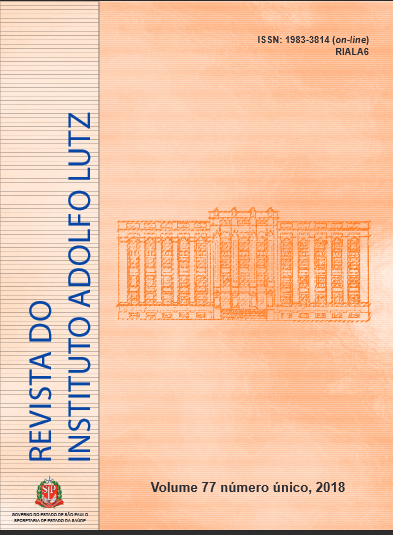Abstract
A historical and epidemiological retrospect of visceral leishmaniasis (VL) in the world and in Brazil, and possible scenarios dependent of environmental, biological and social conditions stands out strategies of surveillance and control, emphasizing the association of procedures with continuity; conquests and controversies in diagnosis, treatment, vaccination and use of deltametrin collar in the dog; and ineffectiveness of canine therapy with available drugs, but good vaccine prospects, in individual protection, and impregnated collar, in collective control. It considers the epidemiological situation potentiated by the galloping urbanization of VL and its geographical dispersion, highlighting control challenges by moving the vector and the infected dog to new areas through road and rail transport, and conflicts of rejection to canine euthanasia. Alert on the high lethality of human LV in areas of recent installation and by increasing association with HIV, imposing early diagnosis and treatment, to avoid clinical worsening and death, and adoption of the active search of human and canine cases incorporated into the routine of the periodic home visits of the Family Health Strategy to detect prolonged fever and other signs of LV and referral to health units. Introducing the infected dog into free transmission areas will remain a major challenge.
References
1. World Health Organization - WHO. Leishmaniasis; 2018. [acesso 2018 Jun 27]. Disponível em: http://www.who.int/news-room/fact-sheets/detail/leishmaniasis
2. Kuhls K, Alam MZ, Cupolillo E, Ferreira GE, Mauricio IL, Oddone R et al. Comparative microsatellite typing of new world Leishmania infantum reveals low heterogeneity among populations and its recent old world origin. PLoS Negl Trop Dis. 2011;5(6):e1155. http://dx.doi.org/10.1371/journal.pntd.0001155
3. Ministério da Saúde (BR). Leishmaniose Visceral; 2018. [acesso 2018 Jun 27]. Disponível em: http://portalms.saude.gov.br/saude-de-a- z/leishmaniose-visceral
4. Gualandi FC. Medicina tropical no Brasil: Evandro Chagas e os estudos sobre a Leishmaniose visceral americana na década de 1930 [dissertação de mestrado]. Rio de Janeiro (RJ): Casa de Oswaldo Cruz, Fiocruz; 2013. Disponível em: https://www.arca.fiocruz.br/bitstream/icict/18984/2/172.pdf
5. Deane LM, Deane MP – Visceral leishmaniasis in Brazil: geographical distribuition and transmition. Rev Inst Med Trop Sao Paulo. 1962; 4:198-212.
6. Lyra MR, Pimentel MI, Madeira MF, Antonio LF, Lyra JP, Fagundes A et al. First report of cutaneous leishmaniasis caused by Leishmania (Leishmania)infantum chagasi in an urban area of Rio de Janeiro, Brazil. Rev Inst Med Trop Sao Paulo. 2015;57(5):451-4. http://dx.doi.org/10.1590/S0036-46652015000500016
7. Marzochi MCA, Fagundes A, Andrade MV, Souza MB, Madeira MF, Mouta-Confort E et al. Visceral leishmaniasis in Rio de Janeiro, Brazil: eco-epidemiological aspects and control. Rev Soc Bras Med Trop. 2009;42(5): 570-80. http://dx.doi.org/10.1590/S0037-86822009000500017
8. Marzochi KBF, Marzochi MCA, Silva VL, Carvalho RW, Souza MB, Gomes MZG et al. Prospective evaluation of human visceral leishmaniasis after treatment in Rio de Janeiro, 1977-1993. In: Brandão-Filho S, editor. Research and control of human leishmaniasis in Brazil. Recife (PE): Fundação Oswaldo Cruz; 1993. p.275-83.
9. Marzochi, MCA. Visceral leishmaniasis in Southern Rio de Janeiro State and the risk of propagation to São Paulo State, Brazil. Rev Soc Bras Med Trop. 2016;49(2):147-9. https://dx.doi.org/10.1590/0037-8682-0442-2015
10. Marzochi, MCA, Coutinho SG, Sabroza PC, Souza MA, Parigot de Sousa P, Toledo LM et al. Leishmaniose visceral canina no Rio de Janeiro - Brasil. Cad Saúde Pública. 1985;1(4):432-46. https://dx.doi.org/10.1590/S0102-311X1985000400004
11. Marzochi MCA – Votuporanga e a leishmaniose visceral: a importância da busca ativa de casos suspeitos. A Cidade, pág.5, 7 fev. 2017.
12. Miró G , Oliva G, Cruz I, Cañavate C, Mortarino M, Vischer C et al. Multicentric, controlled clinical study to evaluate effectiveness and safety of miltefosine and allopurinol for canine leishmaniosis. Vet Dermatol. 2009;20(5-6):397-404. http://dx.doi.org/10.1111/j.1365-3164.2009.00824.x
13. Regina-Silva S, Feres AM, França-Silva JC, Dias ES, Michalsky ÉM, de Andrade HM et al. Field randomized trial to evaluate the efficacy of the Leish-Tec® vaccine against canine visceral leishmaniasis in an endemic area of Brazil. Vaccine. 2016;34(19):2233-9. http://dx.doi.org/10.1016/j.vaccine.2016.03.019
14. Shimozako HJ, Wu J, Massad E. .The preventive control of zoonotic visceral leishmaniasis: efficacy and economic evaluation. Comput Math Methods Med. 2017;2017:4797051. http://dx.doi.org/10.1155/2017/4797051
15. Marzochi MCA, Marzochi KBF, Fagundes A, Conceição-Silva F. A questão do controle das leishmanioses no Brasil. In: Conceição-Silva F, Alves CR, organizadores. Leishmanioses do continente americano. Rio de Janeiro (RJ): Editora Fiocruz; 2014. p.429-63.

This work is licensed under a Creative Commons Attribution 4.0 International License.
Copyright (c) 2018 Mauro Celio de Almeida Marzochi
